 |


By Matthew Brunwasser
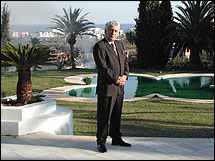 This
case study details the expert machinations of Monzer Al Kassar
in breaking the U.N. arms embargo on Yugoslavia. Distancing himself
from his activities through intermediaries, he appears fully confident
of avoiding any legal liability. This
case study details the expert machinations of Monzer Al Kassar
in breaking the U.N. arms embargo on Yugoslavia. Distancing himself
from his activities through intermediaries, he appears fully confident
of avoiding any legal liability.
The
case illustrates how Al Kassar and his associates tried to obscure
the money trail of an illegal arms sale through various bank
transfers, and it clearly establishes Al Kassar's role as the
broker arranging the sale of Polish arms to Croatia and Bosnia
during the wartime arms embargo on Yugoslavia. The information
presented here is drawn from the report of a Swiss judicial
investigation into Al Kassar's financial activities.

ANATOMY OF AN ILLEGAL
ARMS DEAL
On
June 5, 1990, Monzer Al Kassar and his wife opened an account,
number 1964, at the Audi Bank in Switzerland. Al Kassar and
his wife used their real names and both signed the documents,
highly unusual for a bank account that would later be used in
an illegal arms deal. The initial purpose of the account is
unknown. The bank records from this account and others would
later become evidence used by a Swiss prosecutor to freeze Al
Kassar's proceeds from the illegal sale of Polish arms to Croatia
and Bosnia.
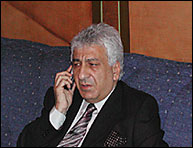 Subsequent
events provided the necessary ingredients for an embargo-breaking
arms deal: a war, an attempt by the international community
to stop it, and a broker able to work around it. Croatia and
Slovenia declared themselves independent from Yugoslavia in
June 1991. A bloody civil war ensued. The United Nations Security
Council voted on September 25, 1991, to impose an arms embargo
on Yugoslavia, whose constituent republics were not yet recognized
by the international community as independent countries. Bosnia
declared its independence in March 1992, which was followed
by an even more bloody and complicated civil war. Subsequent
events provided the necessary ingredients for an embargo-breaking
arms deal: a war, an attempt by the international community
to stop it, and a broker able to work around it. Croatia and
Slovenia declared themselves independent from Yugoslavia in
June 1991. A bloody civil war ensued. The United Nations Security
Council voted on September 25, 1991, to impose an arms embargo
on Yugoslavia, whose constituent republics were not yet recognized
by the international community as independent countries. Bosnia
declared its independence in March 1992, which was followed
by an even more bloody and complicated civil war.
Like many other states, the Swiss Federal Council adopted the
arms ban -- U.N. Security Council Resolution number 713 -- on
December 18, 1991, making the embargo Swiss law (RS 514.545).
This later formed the basis for Swiss legal proceedings against
Al Kassar. U.N. embargoes mean nothing unless they are adopted
by the legislatures of individual U.N. member states and enforced
by their respective legal systems.
Shortly thereafter, a Croatian couple, Snejana and Zeljko Mikulic,
holders of an account at Die Erste Bank in Vienna, ordered $2,649,000
in bank transfers to the account of Bassam Abu Sharif, one of
Yasser Arafat's closest advisors, at Arab Bank in Geneva. A
Die Erste Bank document states that the transfers were for a
shipment of sugar, powdered milk and tea to Croatia.
A few days later, Sharif began a series of transfers, ultimately
totaling $2.3 million, to account number 1964 at Audi Bank,
the account belonging to Monzer Al Kassar.
In turn, Al Kassar transferred $2,549,135 to the Luxembourg
bank account of Cenrex, the Polish state arms company.
ce="Verdana, Arial, Helvetica, sans-serif" size="2">
On March 10, 1992, a Honduras-registered ship, the Nadia, docked
at Ceuta, Spain (a Spanish territory in Morocco) for supplies.
When port officials examined the cargo documents, they found
the papers in order. The 27 containers of arms and ammunition
were being sent by Cenrex in Poland to the defense ministry
of Yemen. After the ship was allowed to proceed, it headed not
to Yemen but to Rijeka, Croatia, where it unloaded.
International
Efforts to Prosecute Al Kassar Founder
In 1992, Spain arrested Al Kassar on charges of piracy and providing
the arms to the Abu Abbas-led PLF terrorists who hijacked the
Achille Lauro cruise ship and murdered American Leon Klinghoffer.
Western intelligence agencies concluded that Al Kassar flew
Abbas to safety aboard one of his private planes after the hijackers
surrendered. One prosecution witness, Ahmed Al Assadi, while
spending time in Vercelli prison for participating in the hijacking,
changed his story and refused to go to Spain to identify Al
Kassar as the person who supplied the hijackers' weapons. After
Al Kassar's arrest, another accuser, Ismail Jalid, fell to his
death from a fifth-story window in Marbella, Spain, in what
the coroner called "an alcoholic coma." During the 1995 trial,
in a highly publicized standoff with police, a third witness's
children were kidnapped by Colombian drug traffickers shortly
before he testified. The witness blamed Al Kassar, who denied involvement and stated, "I have nothing to do with the kidnapping and I hope that it is over as soon as possible. Children are sacred for Arabs. No one, not even your worst enemy, deserves this." Al Kassar was later acquitted
of all charges.
While
building the case, Spain requested that Switzerland seize Al
Kassar's bank accounts. Swiss officials then opened their own
preliminary inquiry into money laundering, lack of vigilance
in financial operations, and fraudulent documents and foreign
certificates. Following this inquiry, Swiss authorities began
to investigate Al Kassar's arms sales using Swiss banks.
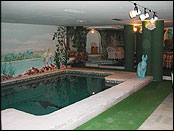 Questioned
on December 9, 1993, by Swiss prosecutors, Al Kassar explained
that he was a diplomatic representative of Yemen in Poland and
therefore could not answer questions about government-to-government
affairs. A search of Al Kassar's Spanish address revealed documents
confirming his relationship to the Croatian Zeljko Mikulic and
containing the codes used for the ship's contents: "Tea" meant
TT pistols (Tula-Tokarev pistols, developed in the U.S.S.R.
in the 1930s and subsequently manufactured by other Eastern
Bloc countries), and "tea bags" meant bullets. Questioned
on December 9, 1993, by Swiss prosecutors, Al Kassar explained
that he was a diplomatic representative of Yemen in Poland and
therefore could not answer questions about government-to-government
affairs. A search of Al Kassar's Spanish address revealed documents
confirming his relationship to the Croatian Zeljko Mikulic and
containing the codes used for the ship's contents: "Tea" meant
TT pistols (Tula-Tokarev pistols, developed in the U.S.S.R.
in the 1930s and subsequently manufactured by other Eastern
Bloc countries), and "tea bags" meant bullets.
Bassam Abu Sharif was questioned by Swiss officials while passing
through Geneva in 1994. He claimed that he had only met Al Kassar
once in 1979 and twice thereafter. He explained that he had
been asked by the Yemeni government to use his bank account
to transfer money for an arms sale organized by the Yemeni ministry
of defense to buy arms for Bosnia and Croatia. He said that
he learned only later that Al Kassar had organized the sale.
A
Determined Swiss Prosecutor Freezes Al Kassar's Millions
Geneva Cantonal prosecutor Laurent Kasper-Answermet upheld his
1992 freeze on $6 million belonging to Al Kassar, arguing that
his financial investigation found the funds to have come from
criminal activities. The financial side of an arms deal leaves
a paper trail, whereas arms hidden in shipping containers, guerilla
armies and corrupt government officials leave none. In 1998,
a Geneva appeals court upheld the seizure but released $3.7
million not directly linked to the arms deal.
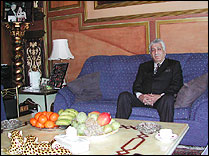 "If
Yemen does a deal with Bosnia and Croatia, how can I control
it?" asked Al Kassar, dismissing accusations that he is an embargo-busting
arms dealer. Under existing legal controls, his question is
reasonable. "If
Yemen does a deal with Bosnia and Croatia, how can I control
it?" asked Al Kassar, dismissing accusations that he is an embargo-busting
arms dealer. Under existing legal controls, his question is
reasonable.
The case is the first of its kind in Switzerland and is expected
to set a precedent. The arms did not touch Swiss territory and
did not involve Swiss citizens or the country in any way other
than through its banking system. Switzerland is not directly
affected by the small-arms trade but has an interest in maintaining
the respectability of its banking system. Such cases, as well
as that of Leonid Minin ,an
Israeli citizen arrested in Italy for selling Ukrainian weapons
to Liberia and Sierra Leone, are pushing existing legislation
in new directions in an attempt to discourage the illegal arms
trade.
Al Kassar has lost successive court appeals and has one final
chance to have his $2.3 million returned in an appeal to a Swiss
federal court.

Matthew
Brunwasser is a freelance journalist based in Bulgaria. He worked
as field producer on FRONTLINE/World's "Gunrunners"
story.

NEXT
SARKIS SOGHANALIAN:
The Cold War's Largest Arms Merchant
|
Links
relevant to this article:
Monzer
Al Kassar and the Iran-Contra Affair
In Chapter 8 of the Final Report of the Independent Counsel
for Iran/Contra Matters, the authors allege that Monzer
Al Kassar made $500,000 selling arms to supply the Contras.
Al
Kassar in Argentina
This Middle East Intelligence Bulletin report describes
the investigation into Al Kassar's involvement in the
Buenos Aires bombings of the Israeli Embassy and the Jewish
Cultural Center, unsolved 10 years later. The report also
describes Al Kassar's possible connection to President
Carlos Menem and the shipment of arms to Croatia.
Al
Kassar and President Menem
This article from Argentina's La Nacion describes the
political price Carlos Menem paid for his alleged involvement
with Al Kassar and the 6000-ton shipment of Argentine
arms to Ecuador and Croatia. (La Nacion, April 15, 2001)
Al
Kassar Fights Back
The Independent (U.K.) documents the public falling-out
between Al Kassar and his former business partner, U.K.
investment firm Imperial Consolidated Group. Al Kassar
says the firm wanted him to sell arms to Osama bin Laden
back in January 2001. The firm denies his accusation. (Independent, January 21, 2001)
Al
Kassar's Estranged Business Partner
Offshore Business News and Research offers a portrait
of Imperial Consolidated's questionable offshore business.
A glance at the links under the heading "Regulatory Problems"
shows that their deal with Al Kassar was only part of
their portfolio.
U.S.
Senate Investigation Into the Bank for Credit and Commerce
International
This 1992 Senate committee report recommended further
investigation into BCCI's "relationships with convicted
Iraqi arms dealer Sarkis Soghanalian, Syrian drug trafficker,
terrorist and arms trafficker Monzer Al Kassar, and other
major arms dealers." This decade-old investigation sheds
some light on the history and interconnectedness of illegal
arms dealers.
|
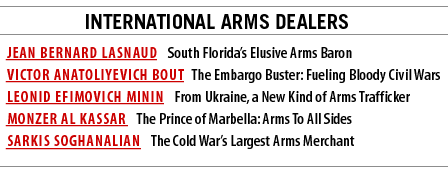
|

